Samsung SSD XP941 Review: The PCIe Era Is Here
by Kristian Vättö on May 15, 2014 12:00 PM ESTPerformance Consistency
Performance consistency tells us a lot about the architecture of these SSDs and how they handle internal defragmentation. The reason we don’t have consistent IO latency with SSD is because inevitably all controllers have to do some amount of defragmentation or garbage collection in order to continue operating at high speeds. When and how an SSD decides to run its defrag or cleanup routines directly impacts the user experience as inconsistent performance results in application slowdowns.
To test IO consistency, we fill a secure erased SSD with sequential data to ensure that all user accessible LBAs have data associated with them. Next we kick off a 4KB random write workload across all LBAs at a queue depth of 32 using incompressible data. The test is run for just over half an hour and we record instantaneous IOPS every second.
We are also testing drives with added over-provisioning by limiting the LBA range. This gives us a look into the drive’s behavior with varying levels of empty space, which is frankly a more realistic approach for client workloads.
Each of the three graphs has its own purpose. The first one is of the whole duration of the test in log scale. The second and third one zoom into the beginning of steady-state operation (t=1400s) but on different scales: the second one uses log scale for easy comparison whereas the third one uses linear scale for better visualization of differences between drives. Click the buttons below each graph to switch the source data.
For more detailed description of the test and why performance consistency matters, read our original Intel SSD DC S3700 article.
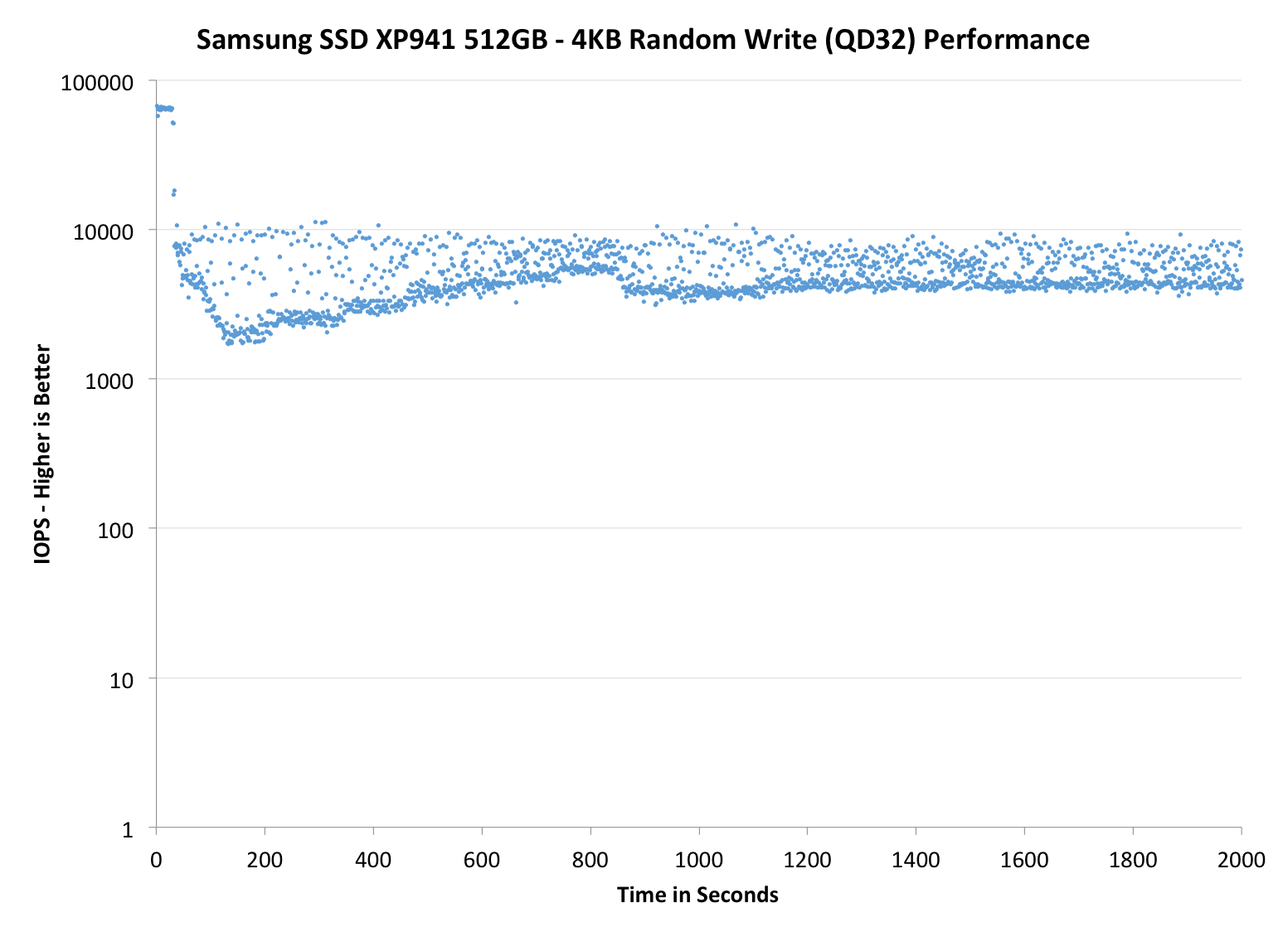 |
|||||||||
| Samsung SSD XP941 | Plextor M6e | Samsung SSD 840 Pro | SanDisk Extreme II | Samsung SSD 840 EVO mSATA | |||||
| Default | |||||||||
| 25% Spare Area | |||||||||
The interface has never been the bottleneck when it comes to random write performance, especially in steady-state. Ultimately the NAND performance is the bottleneck, so without faster NAND we aren't going to see any major increases in steady-state performance.
The graphs above and below illustrate this as the XP941 isn't really any faster than the SATA 6Gbps based 840 Pro. Samsung has made some tweaks to their garbage collection algorithms and overall the IO consistency gets a nice bump over the 840 Pro but still, this is something we've already seen with SATA 6Gbps SSDs. I wouldn't say the IO consistency is outstanding because the Plextor M6e does slightly better with the default over-provisioning (both drives have ~7%) but if you increase the over-provisioning the XP941 will show its magic.
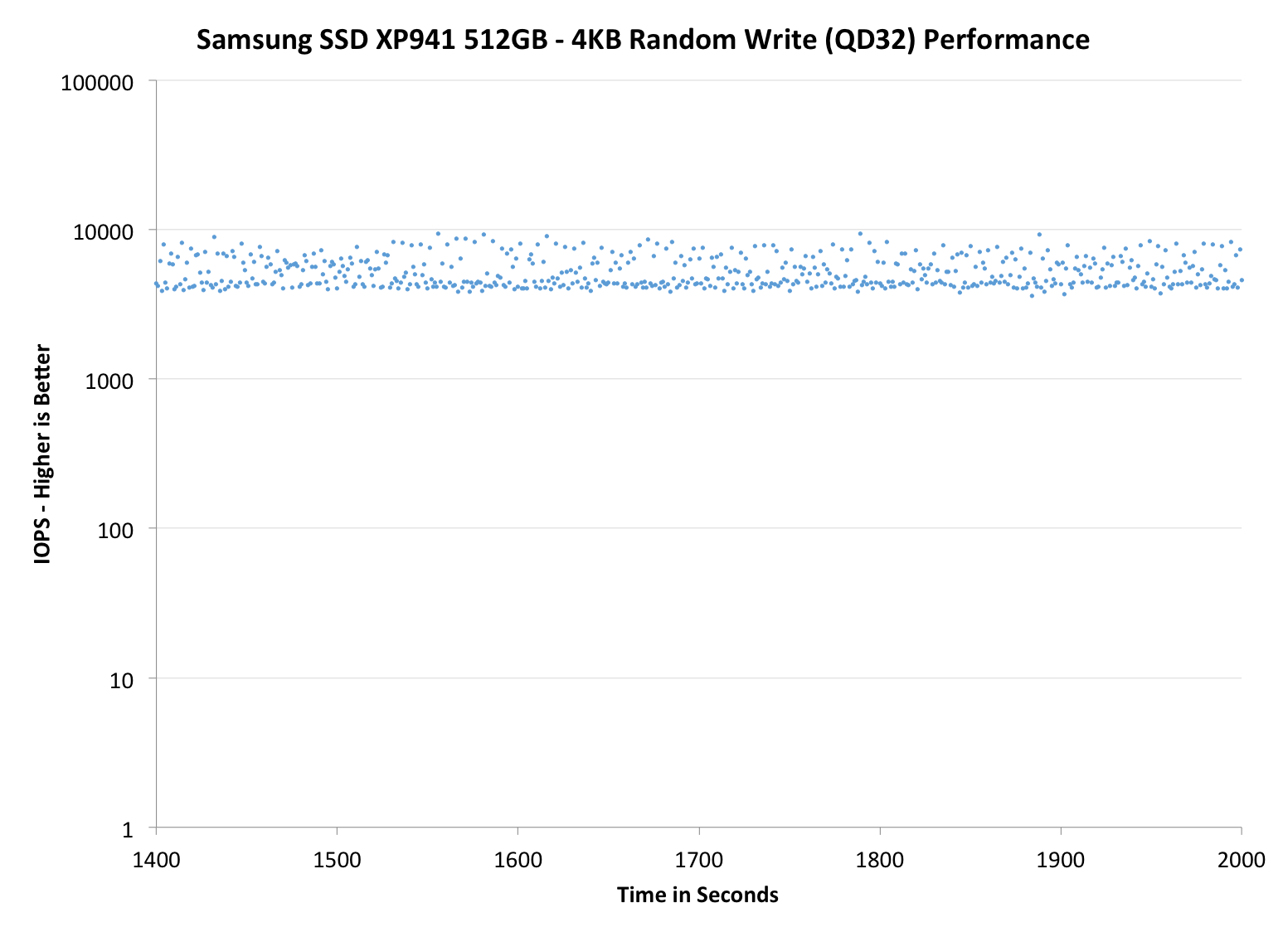 |
|||||||||
| Samsung SSD XP941 | Plextor M6e | Samsung SSD 840 Pro | SanDisk Extreme II | Samsung SSD 840 EVO mSATA | |||||
| Default | |||||||||
| 25% Spare Area | |||||||||
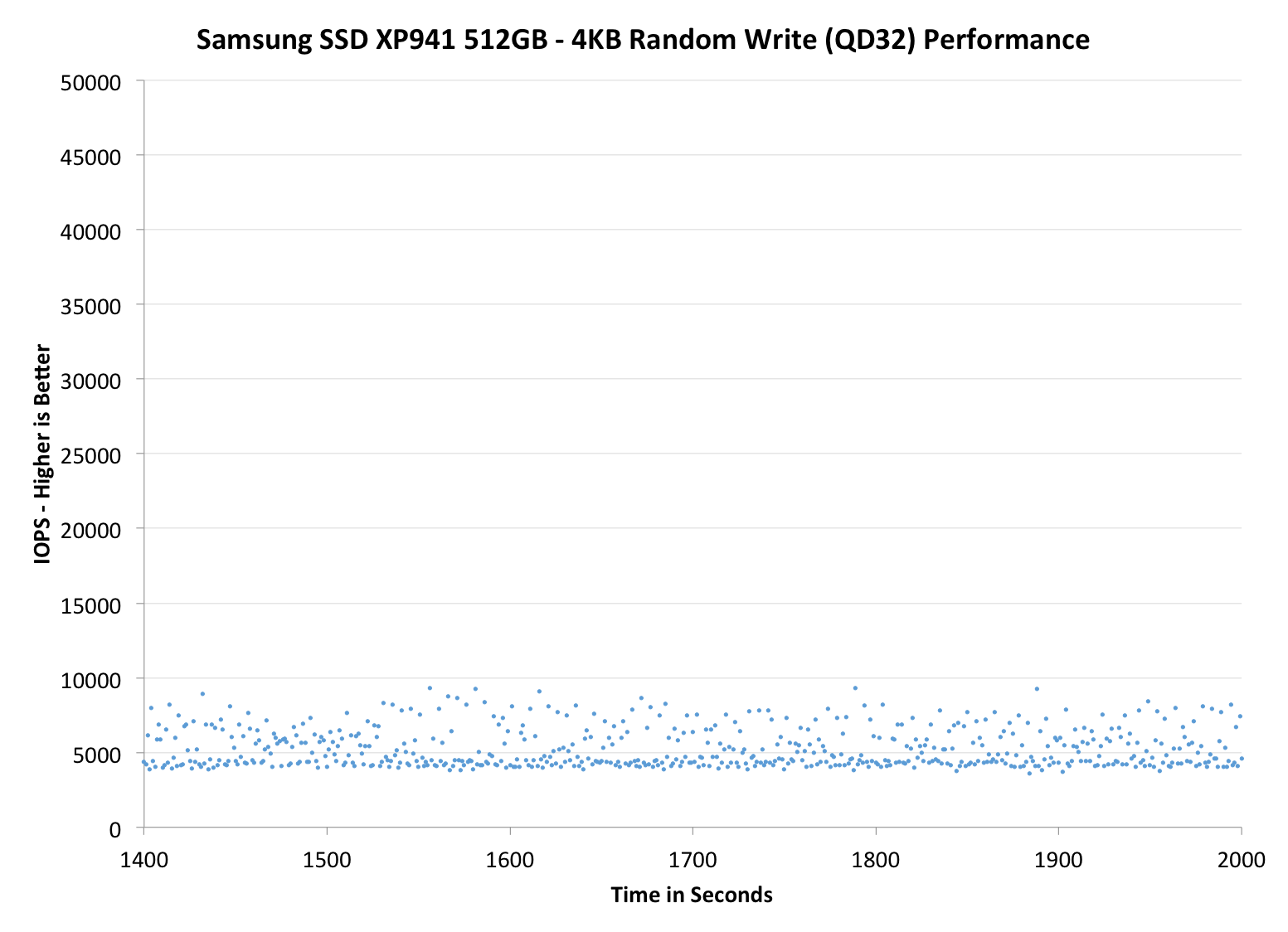 |
|||||||||
| Samsung SSD XP941 | Plextor M6e | Samsung SSD 840 Pro | SanDisk Extreme II | Samsung SSD 840 EVO mSATA | |||||
| Default | |||||||||
| 25% Spare Area | |||||||||
TRIM Validation
Update 5/20: I got an email from one of our readers suggesting that the TRIM issue might be related to Windows 7 and that Windows 8 should have functioning TRIM for PCIe SSDs. To try this, I installed Windows 8.1 to a secondary drive and ran our regular pre-conditioning (fill with sequential data and torture with 4KB random write for 60 minutes). To measure performance, I had to rely on Iometer as HD Tach didn't work properly under Windows 8. I ran the same 128KB sequential write test that we usually run (QD=1, 100% LBA) but extended the length to 10 minutes to ensure that the results are steady and not affected by burst performance.
| Samsung SSD XP941 512GB - Iometer 128KB Sequential Write (QD1) | ||
| Clean | After TRIM | |
| Samsung SSD XP941 512GB | 607.7 MB/s | 598.9 MB/s |
And TRIM seems to function as it should, so it indeed looks like this is just a Windows 7 limitation, which is excellent news.
------------------------
To test TRIM, I took a secure erased XP941 and filled it with sequential data, followed by a 60-minute torture with 4KB random writes (QD32). After the torture, I TRIM'ed all user-accessible LBAs and ran HD Tach to produce the graph below:
It looks like TRIM isn't functional, although I'm not that surprised. I'm waiting to hear back from Samsung about whether this is a limitation in the operating system because I've heard that Windows doesn't treat PCIe drives the same even if they utilize the same AHCI software stack like the XP941 does. If that's true, we'll need either updates to Windows or some other solution.
In a Mac TRIM support is listed as "yes" when TRIM is enabled for third party drives using TRIM Enabler, though I didn't have the time to verify if it actually works.


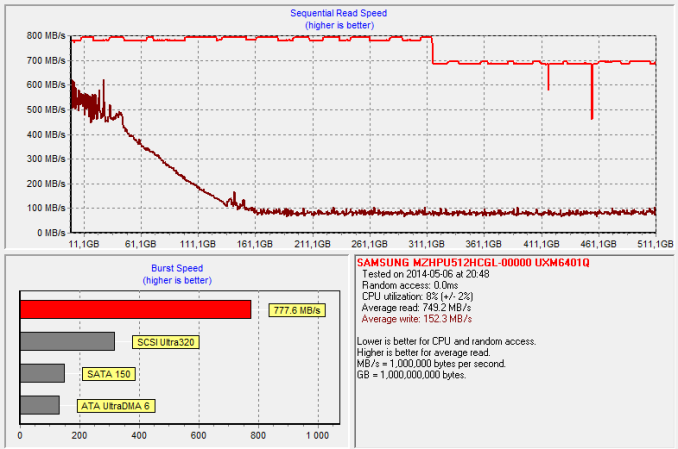
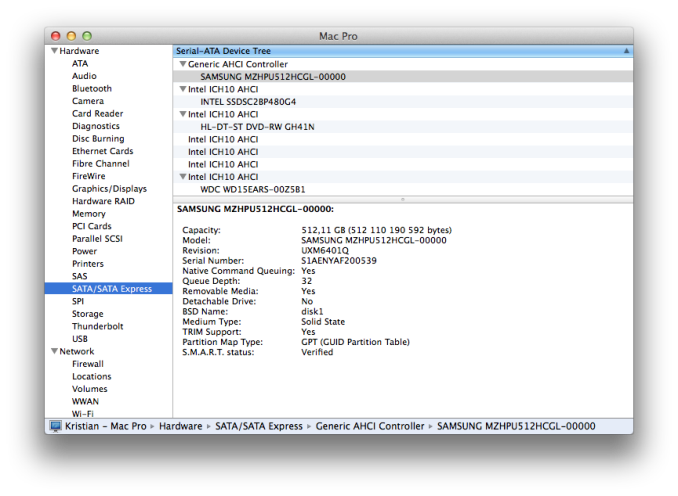








110 Comments
View All Comments
BMNify - Friday, May 16, 2014 - link
rod, if you go ,as well as Everspin, look out for Crocus Technology Russian MRAM HW makers ARM licenced their IP , and Avalanche Technology tooRamCity - Monday, May 19, 2014 - link
Yes, I will be going to Computech. I'll add those vendors to my visit list and check out what they are up to if they have a booth.RamCity - Monday, May 19, 2014 - link
I mean Computex!Jay77 - Thursday, May 15, 2014 - link
I suppose I should read more than the first and last pages if I'm going to make comments.Babar Javied - Thursday, May 15, 2014 - link
There is a mistake/typo in "Performance Consistency & Trim Validation" under the "Trim Validation" section. Below the first graph in the said section, you have wrote "doesn't treat PCIe drives the same even if the utilize the same AHCI" when you ment to say "even if THEY utilize the same AHCI"Ryan Smith - Thursday, May 15, 2014 - link
Fixed. Thank you for pointing that out.BMNify - Thursday, May 15, 2014 - link
so basically you gimped the one and only raid 0 test by not doing it in windows or even better simply boot any linux iso/usb stick and formatted the ssd-xp941 WITH the samsung "F2FS" file system for maximum speed as that is written especially for ssdKristian Vättö - Saturday, May 17, 2014 - link
I did RAID the XP941s in Windows as well but the results were similar so I figured that there is no need to report the results separately.rocky12345 - Thursday, May 15, 2014 - link
I like that there are extra speed speed in these new devices but it seems everyone is so stuck on more speed more speed..lol I am sorry but when a standard SSD can boot a windows 7 in about 6 seconds when are people going to be happy. My Asus laptop has a SSD in it & boots in about 6 to 7 seconds & things like firefox open even before my finger un-clicks the mouse button to open firefox. now everyone is saying standard SSD is to slow..lol to funny. What I would rather like to see is bigger SSD drives at a better price. We already have good speed but the big drives still cost to much for most people when they can make a 1TB SSD at about the same or just slightly more than a standard hard drive then maybe they should be more worried about all these new extreme speed drives but if they make standard SSD drives go the way of the doo doo bird then we are never going to see low priced SSD anything because they will always be treating anything SSD related as new tech just a thought.BMNify - Thursday, May 15, 2014 - link
"but it seems everyone is so stuck on more speed more speed..lol I am sorry but when a standard SSD can boot a windows 7 in about 6 seconds when are people going to be happy..."well obviously speed is not for you, but how do you expect current non volatile ram to lower in price if they don't bring out newer kit to replace it at today's higher price points !
im not sure you understand the driving forces here as regards people wish for faster data access, we really need/WANT a so called "universal non volatile ram [such as those Everspin ST-MRAM DDR3 DIMMs referenced ]" sooner than later at equivalent ddr3 2400,wideIO2,HMC speeds and configurations so we can start to take better advantage of the higher data throughput and data manipulation these bring to the table, its not good enough to x264 encode UHD content in real time right now, then and only then will we start to consider we are starting to get close to enough general speeds, ALIMO.... YMCV